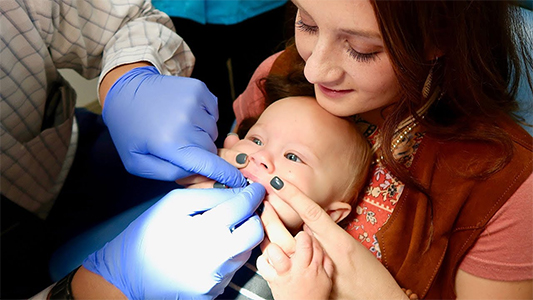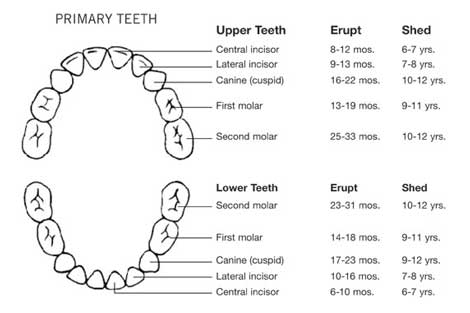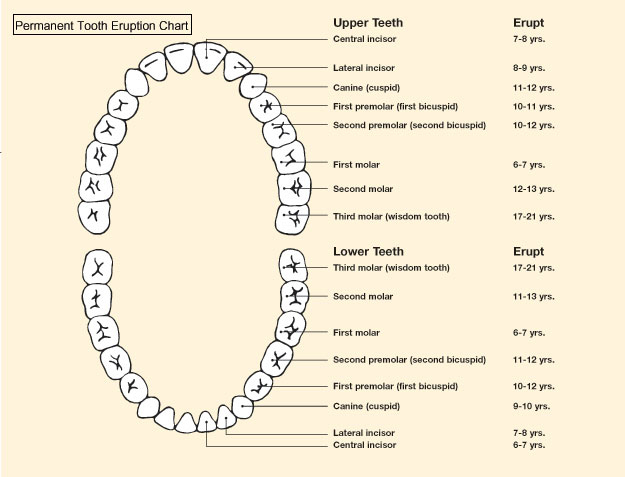Infants & Kids Oral Health
Child First Visit

Baby Teeth are Important
Primary or baby teeth are important because they help with proper chewing and eating; helps in speech development; develops jaw bones and muscle; saves space for permanent teeth and guides them into place; and to sum up contribute an attractive appearance. A child who can chew easily, speak clearly and smile confidently is a happy child. Healthy baby teeth mean a better chance for healthy adult teeth. This is why Indian Dental Association (IDA) has made the Child’s First Visit to the dentist mandatory with the appearance of first tooth and no later than their first birthday.
Oral Health issues
Teething
Babies cry when new teeth erupt, as gums are sore or tender. To soothe gently rub the gums with a clean finger or a wet washcloth. You can also give your baby a clean teething ring to chew. If your child is still uncomfortable, consult your dentist or physician. Contrary to common belief, fever is not normal for a teething baby. Therefore, if your infant has an unusually high or persistent fever while teething, call your physician.
Tooth Eruption

Twenty baby teeth are already formed before birth. Therefore, start the care of your child’s oral health during pregnancy itself. Crowns of the baby teeth are developing and chewing surfaces of the permanent molars are beginning to form during pregnancy. A balanced diet and use of prenatal vitamins help to develop healthy teeth.
A baby’s front four teeth usually erupt first, typically at about six to eight months of age. The rest of the twenty baby teeth appear in pairs along the sides of the jaw until the child is about three years old. The pace and order to their eruption varies.
The first permanent teeth begin to erupt at about age five to six and include molars behind the back baby teeth along with lower central incisors. Some permanent teeth replace baby teeth and some don’t. This process will continue until approximately age fourteen.
Don’t worry if some teeth are a few months early or late as all children have different eruption patterns.
Tooth Eruption Charts
Primary Tooth Eruption

Permanent Tooth Eruption

Avoid low birth-weight or premature births :- Are you aware that during pregnancy, a woman’s hormone levels rise and gingivitis is common? Serious gum disease in the mother has been linked to low birth-weight babies and premature births.
Oral health issues
Babies too have serious oral health issues. First and foremost is the loss of a baby tooth, which can cause the permanent teeth to erupt crooked. Decayed baby teeth can cause pain, abscesses, infections, and can spread to the permanent teeth. Plus, your child's general health can be affected if diseased baby teeth aren't treated.
Infant tooth Decay :- Also known as Early Childhood Caries (ECC), infant tooth decay happens when babies are put to sleep with a feeding-bottle containing sugar in formula, milk or juice. This liquid stays in contact with baby’s teeth during sleep or nap causing the decay.
Gum Disease :- Gingivitis (the first stage of periodontal disease) is nearly a universal problem. This can cause gum tissue to swell, turn red and bleed easily. Gingivitis is preventable and treatable with a regular routine of brushing, flossing and professional dental care. If left untreated, it can eventually advance to more serious forms of periodontal disease.
Pacifiers and Thumb Sucking :- Prolonged use of pacifiers can harm the teeth just like prolonged thumb sucking. The frequency, duration, intensity and position of the thumb in the child’s mouth harm the teeth. If the child continues thumb sucking or pacifier use past the age of four, they may develop crooked teeth, malformed upper jaw and speech problems.
First Dental Visit at Stoma Advance Dental Care
Treatment we offer for kids
Cleaning is done when children do not have inadequate plaque removal at home due to lack of manual dexterity, poor nutrition and children with cavity risk. This is a preventive procedure which prevents cavities by complete removal of bacteria. Soft tissues are examined and screened for any abnormalities.
Sealants seals the biting surface \ occlusal surfaces of the teeth have grooves. This is must for children with a high caries rate. These areas are difficult to clean and decay easily. Sealants reduce the chance of decay on the biting surfaces of the teeth.
Anterior Composite are used as filling on teeth suffering from decay, fracture, chip, broken teeth and decalcification. This improves esthetics, self esteem improves. The removal of decay and the placement of a filling restores the original form and function of a tooth.
Posterior Composite are used as filling for decayed, fractured, chipped, broken teeth, decalcified and malformed teeth. The removal of decay and the placement of a filling restores the original form and function of a tooth.
Preventive counseling offered at Stoma Advance Dental Care
Infant Oral Hygiene Care :- Wipe infant’s teeth gently with a moist, soft cloth or gauze square at least twice a day, especially before sleeping. Brush twice a day when the first tooth comes in using soft-bristled toothbrushes designed for babies with water or a very small amount of non-fluoridated toothpaste. Change brush every three months.
Do not put the baby to sleep with a bottle or while breastfeeding. This habit causes cavities when your baby has teeth especially if milk, formula, juice or other sweetened liquid is used in bottles. Only water should be put in a bottle or cup if your child cannot fall asleep without it. If you breast feed your baby – remember to wipe the teeth with a damp washcloth as soon as he or she falls asleep and stops sucking.
Tooth cavity causing bacteria can be transmitted to the fetus, so it is important to reduce plaque and have teeth free of decay before the birth of a child. If you are pregnant, be sure to visit your dentist regularly and have your teeth cleaned more often. At birth, bacteria may also be transmitted by a mother kissing her newborn child. Sharing items such as spoons, pacifiers, toothbrushes and toys can spread cavity-causing germs between caregiver and baby and between babies themselves.
Advice on Nutrition and Healthy Eating :- Good eating habits that begin in early childhood can go a long way to ensuring a lifetime of good oral health. You should plan meals which include fruits, vegetables, grains and proteins like eggs and nuts; curtail use of unhealthy fast foods. Frequent ingestion of sugars and other carbohydrates (eg, junk food, juices and acidic beverages) and prolonged contact of these substances with teeth are risk factors in the development of caries. Children at high risk for cavities should restrict their liquid intake to water and milk.
Cavity Prevention :- Cavities are created due to a diet high in sugary foods and a lack of brushing. Limit sugar intake and brush teeth regularly. Chances of developing cavity are greater if the child takes time to chew foods as the residue stays on their teeth. An acid reaction occurs inside their mouth as the bacteria digest the sugars. This reaction lasts approximately twenty minutes. This acid environment destroys the tooth structure, eventually leading to cavities.